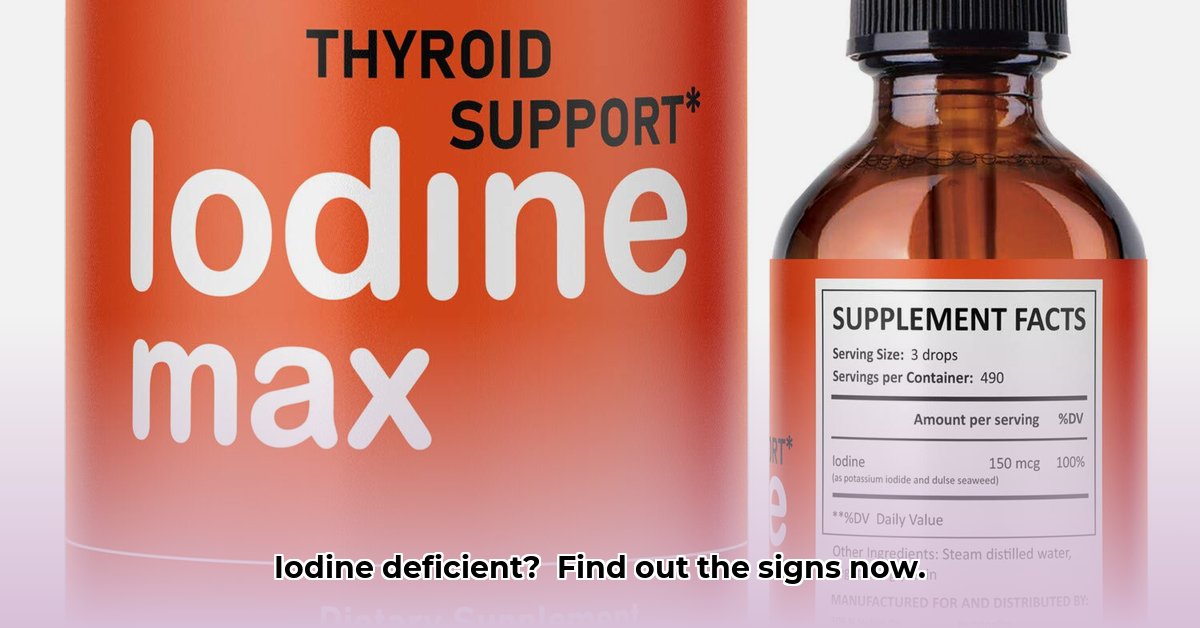
Understanding Iodine Deficiency: A Silent Threat to Your Health
Eish, feeling a bit moeg? Or maybe your skin's a bit dry, or your hair's looking a bit thin? These might seem like small things, but sometimes they hint at something more - an iodine deficiency. Iodine, a trace mineral, is crucial for your thyroid gland, the boss of your metabolism, controlling everything from your energy levels to your mood. Without enough iodine, your thyroid can’t do its job properly, leading to a range of problems.
Have you ever wondered why you might be feeling this way? A lack of iodine can be the culprit. It’s a common problem, particularly amongst pregnant women and people following specific diets so it's important to be aware of the signs.
Iodine's Role in Thyroid Function
Your thyroid gland relies on iodine to produce thyroid hormones which regulate your body's metabolism. These hormones are vital for countless bodily functions, ensuring everything runs smoothly. When iodine levels are low, the thyroid struggles to produce these hormones, leading to a sluggish metabolism and a cascade of potential symptoms.
Think of it like this: your body's a car, and iodine is the high-octane fuel. Without it, the engine sputters and struggles.
Who's at Risk?
Certain groups are more vulnerable to iodine deficiency. This includes pregnant and breastfeeding women (the increased demand for iodine ensures baby's development), vegans and vegetarians (iodine is often found in animal products), and individuals living in regions with iodine-poor soil. If you fall into one of these categories, it's particularly important to pay attention to your iodine intake.
Did you know that iodine deficiency is more prevalent in certain geographical areas? It's vital to take note of this geographical factor for an accurate assessment.
Recognising the Signs of Iodine Deficiency: From Mild to Severe
The symptoms of iodine deficiency vary, depending on the severity and duration of the deficiency. A mild deficiency might manifest as mild fatigue, while a severe, long-term deficiency can lead to more serious health problems like hypothyroidism (an underactive thyroid) or, in severe cases, goitre (a swelling in the neck). In babies, it can even lead to severe developmental delays. Early detection is key.
What are the early warning signs you should look out for? Let's explore the symptoms in more depth.
Mild Iodine Deficiency Symptoms
- Occasional tiredness
- Slight weight gain
- Slightly dry skin
Moderate Iodine Deficiency Symptoms
- Persistent fatigue
- Noticeable weight gain
- Dry, flaky skin
- Thinning hair
- Difficulty concentrating
Severe Iodine Deficiency Symptoms
- Extreme exhaustion
- Significant weight gain
- Rough, cracked skin
- Significant hair loss
- Cognitive decline
- Goiter (swelling in the neck)
How to Increase Your Iodine Intake Safely
The good news is that iodine deficiency is largely preventable. Here’s how you can boost your iodine intake safely and effectively:
Iodise Your Salt: Using iodized salt (table salt with added iodine) is the simplest and most effective way to increase your iodine intake. Most supermarkets stock iodised salt.
Eat Iodine-Rich Foods: Include iodine-rich foods in your diet. These include:
- Seafood (especially cod, tuna, and kelp)
- Dairy products (milk, yoghurt, cheese)
- Eggs
Consider Supplements (With Caution): If you're concerned about your iodine levels, consult your doctor or registered dietitian before taking supplements. Self-medicating can be dangerous. They can perform blood tests and assess your iodine levels. "It's crucial to get personalised advice on iodine supplementation," advises Dr. Sarah Jones, Endocrinologist at Cape Town University Hospital.
Regular Check-ups: Regular blood tests can help monitor your thyroid function and iodine levels. This is particularly important for pregnant women and individuals in high-risk groups.
When to Seek Medical Attention
Don't hesitate to consult your doctor if you experience persistent fatigue, unexplained weight changes, or swelling in your neck. Early diagnosis and treatment can help prevent more severe complications.
Key Takeaways: Prioritise Iodine for a Healthier You
- Iodine is essential for thyroid function and overall health.
- Iodine deficiency can lead to a range of symptoms, from mild fatigue to severe health problems.
- Iodized salt, iodine-rich foods, and (under medical supervision) supplements can help boost your iodine levels.
- Regular health check-ups are crucial for early detection and prevention.
Remember, maintaining sufficient iodine levels is vital for your overall wellbeing. By taking proactive steps, you are safeguarding your health and ensuring your body has the essential nutrients it needs. Gesondheid! (Health!)